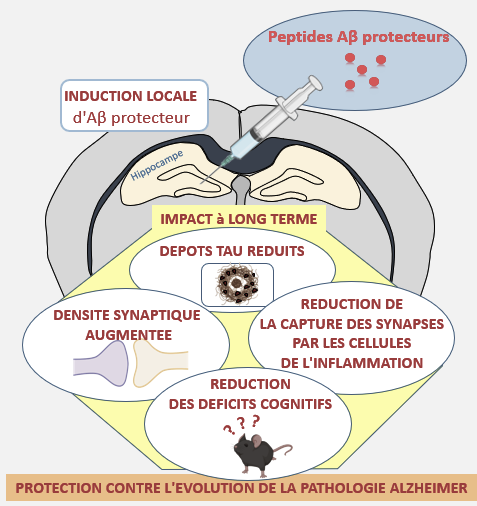News, SPPIN seminars
4 September 2025 – Marc DHENAIN – Pseudo-prions to treat neurodegenerative diseases
Dr. Marc DHENAIN, Neuro-Bicêtre, Bicêtre Hospital, Le Kremlin Bicêtre
SPPIN’s webinar 2025, 4 September at 11h, SPPIN common room, 3rd floor
Pseudo-prions to treat neurodegenerative diseases


Alzheimer’s disease is the result of cerebral degeneration, caused by the abnormal accumulation of β-amyloid and tau proteins in the brain. For several years, the scientific community has believed that the toxicity of β-amyloid proteins is responsible for the induction of tau proteins. Currently, no therapy can satisfactorily block the progression of the disease.In Iceland, genetic studies have revealed that a mutation in a precursor of β-amyloid proteins (called the Icelandic mutation) protects against Alzheimer’s disease.
How is such protection possible? It has long been known that β-amyloid proteins behave like prions. This means that intracerebral inoculation of pathological β-amyloid proteins leads to the recruitment of normal brain proteins and the transformation of their conformation into pathological proteins, leading to an amplification of the lesions. β-amyloid proteins are called pseudo-prions. Prion proteins (or pseudo-prions) are characterized by a stemness1 effect. This means that different proteins can fold differently when inoculated intracerebrally, causing various symptoms.
We hypothesized that the β-amyloid protein with the Icelandic mutation could behave as a protective pseudo-prion. Based on this conjecture, we inoculated this mutated protein into mouse models of Alzheimer’s disease and observed that these mice retained their memory for months following the injection. In addition, these mice were protected from the appearance of tau-positive lesions and synaptic loss. What is extremely surprising is that a single administration was sufficient to trigger this protection, which lasts for several months. The study thus shows for the first time, in mice, that “pseudo-prion” amyloid beta proteins can protect the brain from the damage characteristic of Alzheimer’s disease.
This result could thus be the starting point for a new category of preventive therapies to treat people with neurodegenerative diseases at early stages and block the progression of the pathology, thanks to the injection of protective prions.
References
Célestine M, Jacquier-Sarlin M, Borel E, Petit F, Lante F, Bousset L, Hérard AS, Buisson A, Dhenain M. Transmissible long-term neuroprotective and procognitive effects of 1-42 beta-amyloid with A2T icelandic mutation in an Alzheimer’s disease mouse model. Mol Psychiatry. 2024 Jun 14. doi: 10.1038/s41380-024-02611-8. Epub ahead of print. PMID: 38871852
Dhenain lab website : https://dhns-inserm.fr/
